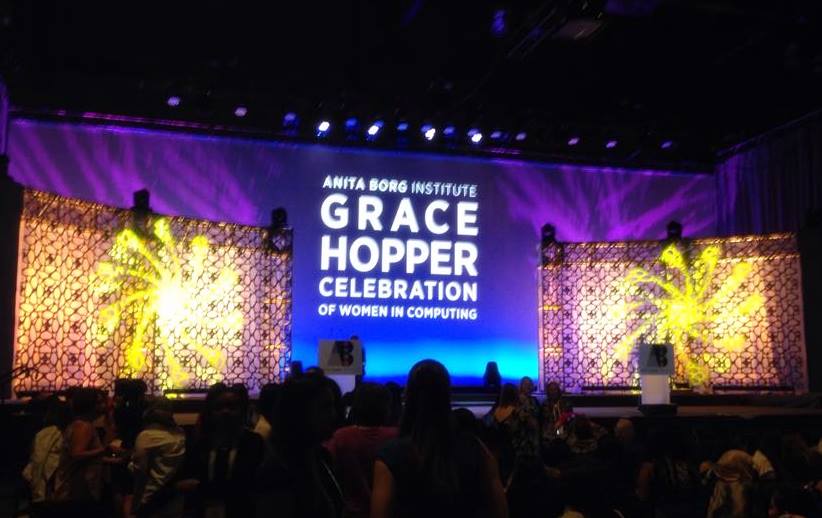Last week, I traveled to Phoenix (along with 8,000 other women and a few men), supported by a generous scholarship sponsored by Target, to attend the Grace Hopper Celebration of women in computing, put on by the Anita Borg Institute. This was my first time in attendance, and as someone moving away from astronomy more towards the computing field I was unsure of what to expect.

To clarify, I earned a PhD in Astronomy in 2013, realized I did not want to spend the rest of my life studying the metallicity of gas in star forming regions in galaxy outer disks, and looked towards applying my scientific background to areas of data science that have a more obvious direct impact on people. I also love to program. I’m currently in the Laboratory for Advanced Computing in the Center for Data Intensive Science under UChicago’s Department of Medicine. So I went to GHC as an astronomer turned computational data science researcher doing geospatial health informatics analysis and looking to expose myself to a diverse community of researchers and women involved in computing in all areas.
Getting my bearings in this new environment, there were a number of things that struck me from the perspective of a woman in astronomy and a researcher in academia.
1. The most impactful voices regarding equality of women and men are positive. I attended a great session in which Maria Klawe interviewed Satya Nadella, the CEO of Microsoft, and walked away feeling inspired and empowered. I was later surprised to watch the media blow-up and everyone on the internet vilify the first male to be invited to a plenary session at GHC and in the fury drown out Maria Klawe’s memorable advice. Maria had relayed a question from the audience to the effect of “What advice would you give to a woman who wants to ask for a raise?” and, as I recall, Satya’s advice was not “do not ask for a raise” but more to the effect of “it’s not about asking for a raise.” His advice was to have confidence in your superpowers and confidence in the system.
Was he wrong? Yes, it is clear that women cannot rely on the current system.
Was he right? Yes, it is also clear that to ask for raises women need to be more confident in their superpowers. A large part of the disparity in wages between men and women is due to the fact that women are less likely to negotiate salaries, particularly when wage determination is ambiguous. So we need a system that allows wage determination to be more open and ‘talkable,’ and women need to negotiate their salaries. Did you know that postdocs can often negotiate their salary? I didn’t, until I asked a male friend in the field, who told me “YES” with capital letters before I accepted my current position, thankfully.
Anyway, the much more impactful words to those in the room (or at least myself) were in Maria Klawe’s response to Satya. She admitted she has never asked for a raise. She also told us all about how she once accepted a job before her salary was determined, told the University “oh, pay me whatever,” and later realized she was probably shorted about $50,000 of what she deserved. Her advice to everyone was this: “Do your homework.” I walked away noting that I know I have superpowers, and I need to know my worth and do my homework.
It is easy to be critical when someone slips up. There was a little bit of grumbling at GHC, but it did not seem to be well received. GHC is a celebration, which is likely one of the reasons it has been able to grow. I was impressed by the speakers affiliated with the Anita Borg Institute during the next morning’s session who commented only briefly to remind us all that when we’re all trying to move from A to B, and someone wants to join you on your journey towards progress, if they fall, you pick them up, and help them keep going. A consistent theme throughout the celebration was about raising people up, being a leader, a mentor, an ally, and an agent of change, passing it on, and generally making sure to look down the ladder to help those behind you on your way up.
2. Be forward thinking in your career by finding your own theme. I intended to go to GHC and focus on the ‘data science’ track sessions, but there were so many great sessions about professional development, and since trying to switch fields and “rebrand” myself, I’ve felt weighted with the ‘wrong’ background so decided to check them out. I’m not sure if I avoided professional development sessions at astronomy meetings as not science-y enough or if they didn’t exist or were not as helpful or if maybe I wasn’t in the right frame of mind before, but one of the best sessions I went to was about planning out your career.
The session started with a prompt to get out a sheet of paper and write down two sentences describing your direction of focus. I always hate to do these things and think they’re generally nonsense, but one of the speakers suggested jotting down all the projects or areas of interest you are involved with and trying to find the common theme. She said, “if you think they’re not related, they are, because you’re doing all of them,” which really resonated with me since I feel like my background and interests are very scattered.
I’m still working on my theme, but the projects I am most interested in are related to research integrating data across disciplines, doing reproducible analysis, and educating others about effective tools for pushing scientific discovery in a data-driven field. I’ve already found that sketching out my theme has helped me pare down and say no to activities where I am overcommitted and focus on projects most closely related to my theme of interests.
3. Astronomers would benefit from early training that is more broadly applicable to industry interests. There are a lot of really young professors in computing.** **I went to a session that was primarily faculty and realized that everyone was my age. What?!? I commented about this to my roommate, and she told me that PhDs in Computer Science might do one postdoc before getting a faculty position. WHAT?!?? I then asked a PhD in our lab about this, and she also told me that lots of people go from grad school straight to faculty and that maybe you do a postdoc if you’re not sure what topic you’re interested in. Many people quickly get jobs in industry instead of academia.
In astronomy, people might go 4 or 5 postdocs before getting a faculty position, and many won’t ever get one. Why is this? I think that the overlap in skills between industry and academia is obvious in computing. GHC was flooded with industry recruiters. Do astronomers lack skills to be successful in industry? No, quite the opposite. Astronomy is the mother of statistics, and it is the original data-driven field- no setting up your experiment, the sky is what you get. But where CS and computing fields are recognizing the overlap of industry and a diversity of skills very early on, graduate programs in astronomy consider a well-rounded researcher (in my experience) to have training in planetary formation to galaxies to large-scale structure of the universe. Instead, we would benefit from formal training in computer programming, databasing, statistics, machine learning, data mining, and all of the things that come to light when stepping back and considering what is both essential to modern astronomy and also valuable to industry as skills needed in any data-driven field.
4. Lastly, always go to the conference party. That’s the same in astronomy and computing. :)
